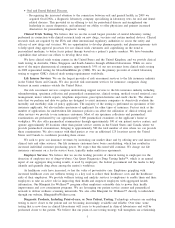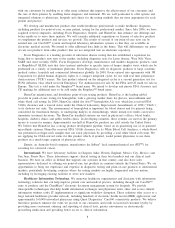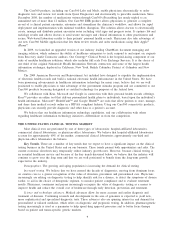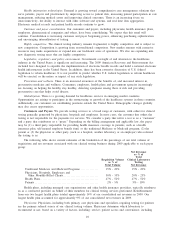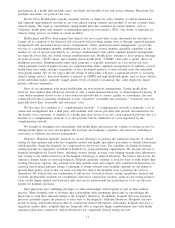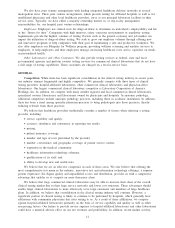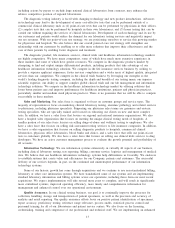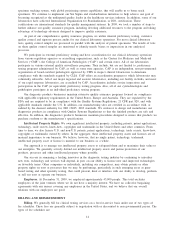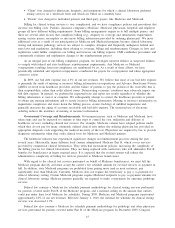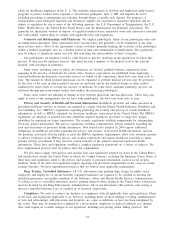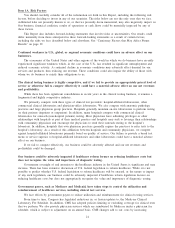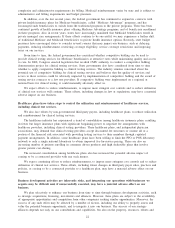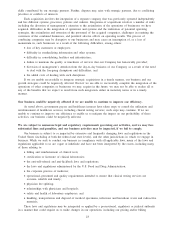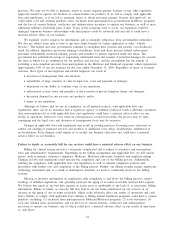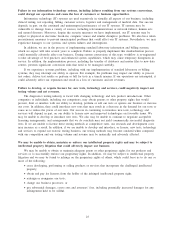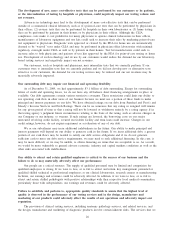Quest Diagnostics 2009 Annual Report Download - page 26
Download and view the complete annual report
Please find page 26 of the 2009 Quest Diagnostics annual report below. You can navigate through the pages in the report by either clicking on the pages listed below, or by using the keyword search tool below to find specific information within the annual report.enacted a 60-day hold on a potential 21.2% decrease in this schedule that would otherwise have gone into effect
January 1, 2010. In 2009, approximately 3% of our net revenues were reimbursed based on this fee schedule.
CMS is permitted to adjust statutorily prescribed fees for clinical test services if the standard rules by which
those payments are calculated will result in fees that are “grossly excessive.” CMS rules set forth a process and
factors for establishing a “realistic and equitable” payment amount for clinical test services under Medicare Part
B (and services paid under a prospective payment system) if existing payment amounts are determined to be
inherently unreasonable; payment amounts may be considered unreasonable if they are either grossly excessive or
deficient. Under CMS rules, if CMS or a carrier determines that an overall payment adjustment of less than 15%
is needed to produce a realistic and equitable payment amount, then the payment amount is not considered
“grossly excessive or deficient.” However, if a determination is made that a payment adjustment of 15% or more
is justified, CMS could provide an adjustment of less than 15%, but not more than 15%, in any given year. Fees
payable by Medicare could be reduced prospectively as a result of the application of these rules.
We are generally permitted to bill Medicare beneficiaries directly for statutorily excluded testing services.
An advance beneficiary notice (“ABN”) is a notice signed by the beneficiary which documents the patient’s
informed decision to personally assume financial liability for tests which are likely to be denied and not
reimbursed by Medicare because they are deemed to be not medically necessary for the patient (these tests
include limited coverage tests for which the ordering physician did not provide an appropriate diagnosis code and
certain tests ordered on a patient at a frequency greater than covered by Medicare). We do not have any direct
contact with most of these patients and, in such cases, cannot control the proper use of the ABN by the
physician or the physician’s office staff, who must obtain the ABN on our behalf. If the ABN is not timely
provided to the beneficiary or is not completed properly, we may end up performing tests that we cannot
subsequently bill to the patient if payment is denied by Medicare due to coverage limitations.
Penalties for violations of laws relating to billing federal healthcare programs and for violations of federal
and state fraud and abuse laws include: (1) exclusion from participation in Medicare/Medicaid programs; (2) asset
forfeitures; (3) civil and criminal fines and penalties; and (4) the loss of various licenses, certificates and
authorizations necessary to operate our business. Civil monetary penalties for a wide range of violations may be
assessed on a per violation basis. A parallel civil remedy under the federal False Claims Act provides for
damages on a per violation basis, plus damages of up to three times the amount claimed.
Historically, most Medicare and Medicaid beneficiaries were covered under the traditional Medicare and
Medicaid programs directly administered by the federal government. Over the last several years, the federal
government has continued to expand its contracts with private health insurance plans for Medicare beneficiaries
and has encouraged such beneficiaries to switch from the traditional programs to the private programs, called
“Medicare Advantage” programs. There has been continued growth of health insurance plans offering Medicare
Advantage programs and of beneficiary enrollment in these plans. In recent years, in an effort to control costs,
states also have increasingly mandated that Medicaid beneficiaries enroll in private managed care arrangements. If
these efforts continue to be successful, we may experience a further shift of traditional Medicare and Medicaid
beneficiaries to private health insurance options.
REGULATION
Our businesses are subject to or impacted by extensive and frequently changing laws and regulations in the
United States (at both the federal and state levels) and the other jurisdictions in which we conduct business.
These laws and regulations include regulations over aspects of our business, and laws and regulations relating to
conducting our business generally (e.g., export controls laws, U.S. Foreign Corrupt Practices Act and similar laws
of other jurisdictions), including in the United States and in the other jurisdictions in which we conduct business.
We also are subject to inspections and audits by governmental agencies. Set forth below are highlights of the key
regulatory areas applicable to our businesses.
CLIA and State Clinical Laboratory Licensing Regulations. All of our laboratories and, where applicable,
patient service centers are licensed and accredited as required by the appropriate federal and state agencies. CLIA
regulates virtually all clinical laboratories by requiring that they be certified by the federal government and
comply with various operational, personnel and quality requirements intended to ensure that the services provided
are accurate, reliable and timely. The cost of compliance with CLIA makes it cost prohibitive for many
physicians to operate clinical laboratories in their offices. However, manufacturers of laboratory equipment and
test kits could seek to increase their sales by marketing point-of-care test equipment to physicians and by selling
to both physicians and patients test kits approved by the FDA for home use. Diagnostic tests approved or cleared
by the FDA for home use are automatically deemed to be “waived” tests under CLIA and may be performed in
physician office laboratories with minimal regulatory oversight under CLIA as well as by patients in their homes.
16



